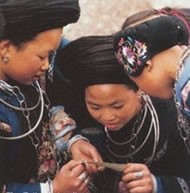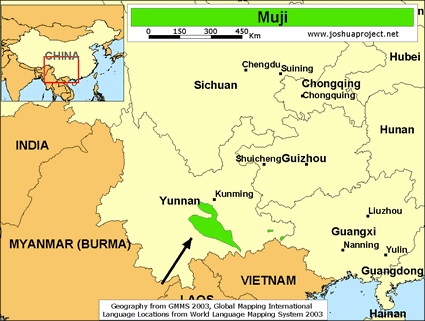The Muji were first listed in a 1903 survey of the tribes of western China. Today, even though they consider themselves a distinct people group with their own traditional dress and language, the Chinese government includes the Muji as part of the large, diverse Yi nationality.
Over the last 200 years the Muji have been pushed deep into the mountains by Han Chinese and settlers from other minority groups. Those who chose to stay in the plains were soon assimilated. Because their villages are located high in the mountains, often on rocky soil, the staple food of the Muji is maize.
Although Muji women north of the Honghe River wear an intricately decorated headdress which covers their entire head, their counterparts south of the river prefer to wear theirs differently. The southern Muji women have a peculiar custom of braiding their long hair into one thick braid and wrapping the braid around their foreheads. A decorative headdress is then worked into the braid producing a lovely, natural crown.
When a baby is born to a Muji couple, the child is thought to need a godfather and godmother. When the child turns six or seven years old, a suitable relative or friend is chosen who will provide protection and safety through life and into the afterlife. "A ceremony is held for which the parents prepare chicken and whisky and take the child to the home of his or her selected godfather and godmother. The godparents bestow a surname on the child, and then give the child symbolic jewelry and clothing. The ceremony comes to an end when the 'spirit rope' is fastened around the child's wrist. The spirit rope is thought to ensure the safe passage of the child's soul through life and into death."
Although Miao churches exist in some of the areas inhabited by the Muji, there is very little contact and no linguistic similarity between the Miao and the Muji. There is at least one known Muji Christian, an elderly lady who said she believes in Christ because only he could heal her of her ailments. There may be a small number of Muji attending the one church situated in Gejiu City; otherwise there are no other known Christians among the unreached Muji people group. Muji gospel recordings were first produced in 1999.
Without the guidance of Christ, these people are like sheep without a shepherd. They need the good shepherd in their families and communities.
Pray for the authority of Christ to bind hindering spiritual forces to lead them from darkness to light.
Pray for signs and wonders to happen among them and for great breakthroughs with a rapid multiplication of disciples and house churches.
Pray for bold workers who are driven by the love of the Holy Spirit to go to them.
Pray for an unstoppable movement to Christ among them.
Scripture Prayers for the Muji, Southern in China.
Operation China, Asia Harvest, Copyrighted © Used with permission
| Profile Source: Joshua Project |











